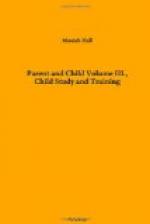Acquirements of parents during their lifetime, according to the best authorities, are not transmitted to any noticeable extent to their children. This appears to be due to the fact that the cells concerned in reproduction are set aside during embryonic life and from then on are practically unmodified by the succeeding development and experiences of the parent. In fact, during the lifetime of the individual, the germ cells are so completely isolated from the growing organism that nothing but nourishment in the shape of blood can possibly reach them, hence they can be affected only by a vitiated or poisonous blood supply. It seems to be true, therefore, that only the old, deeply-impressed traits, capacities, or racial characters can be inherited. This is, no doubt, the chief secret of the power of heredity to breed true.
It has been a popular belief that if parents acquired skill in music, mathematics, or special ability in any other particular that such ability could be imparted to their children, but in the light of the above facts, this appears to be impossible. Of course, if such ability is a slumbering, inborn trait of either parent, or of some immediate ancestor, the ability might be transmitted.
It is reasonable to suppose, however, that any acquired trait or ability of the parent, if practised and continued steadily by his children and their descendants for many generations, will come to be an inborn trait or character capable of being transmitted. Otherwise, it is extremely difficult to understand how the human family can progress and become permanently improved.
Galton’s law is believed to be approximately correct. It may be stated as follows: Children inherit on the average one-half their characteristics from parents, one-fourth from grandparents, one-eighth from great-grandparents, and so on in ever diminishing ratio to remote ancestors. But owing to the fact that some inheritable traits or characters are likely to be dominant and others recessive, Galton’s law must be modified, so that only under the most favorable conditions can it be regarded as reliable.
Owing to the fact that the primary elements or traits of character contributed by each parent may combine in many ways in the embryo, considerable variation in the children of the same parents is inevitable—one child may resemble the father, another the mother, and yet another some near ancestor. Variability is, therefore, the rule among offspring in the same family, and in some instances it is decidedly pronounced, but in all cases, the variation must be confined to the possible combinations of characters transmitted from parents and ancestors.




